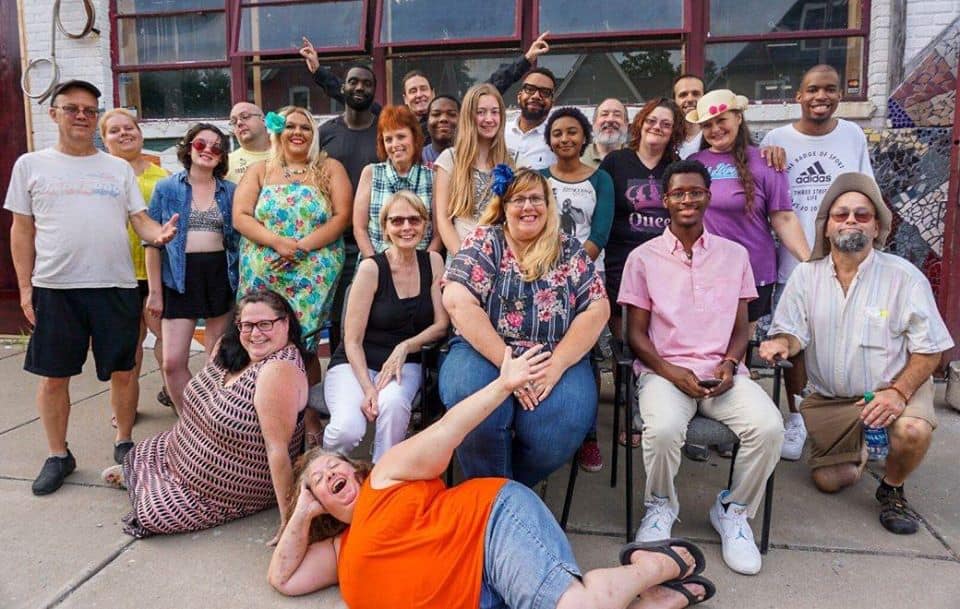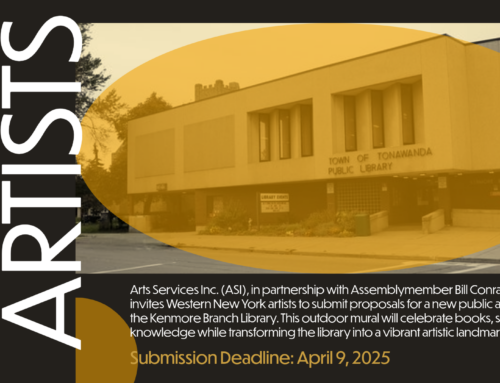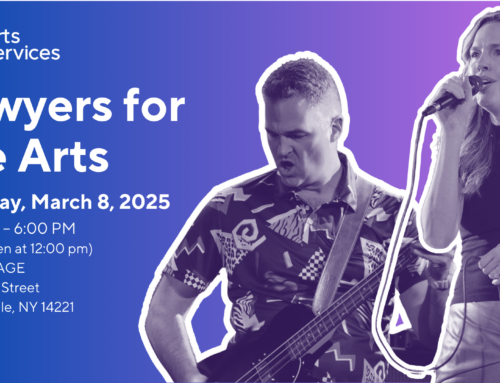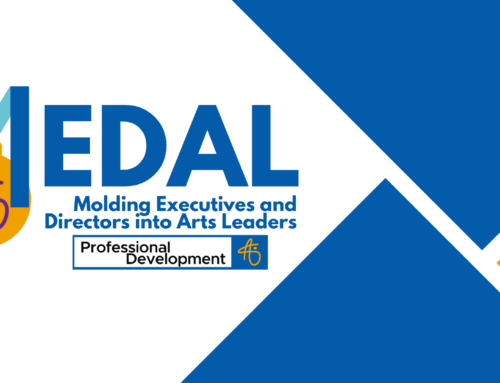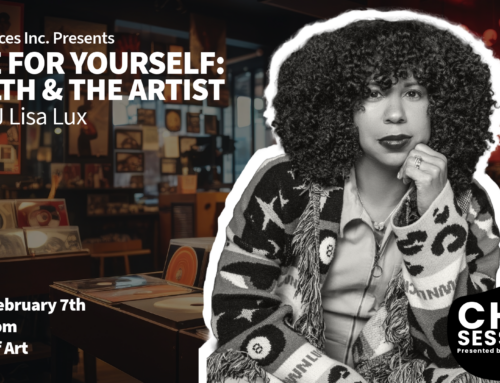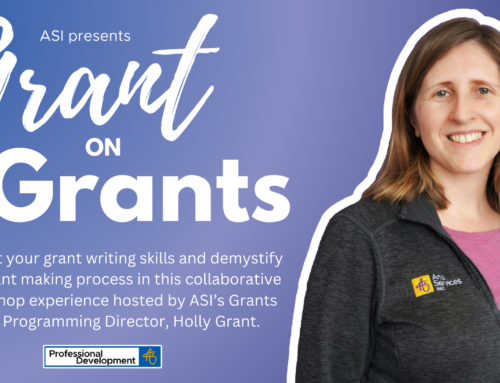Photo: The Inclusive Theater cast of the Shakespeare in the Parking Lot performance of “A Midsummer Night’s Dream.”
Aimee M. Levesque, PhD is the founder, executive, and artistic director of Inclusive Theater of WNY, a performing and visual arts company that promotes inclusion, diversity, and respect in the arts by welcoming people of all levels of experience and ability to participate in its productions. Last year, Dr. Levesque received ASI’s Spark Award for Rising Star, and she just keeps rising: in February, Inclusive Theater received a prestigious IDEA Award from Buffalo Business First.
We sat down with Dr. Levesque to learn more about the background and vision that she brings to Inclusive Theater—including the person she calls her driving force.
ASI: Tell me a little about the history of the Inclusive Theater of WNY: When and how did it begin?
AL: In November of 2015, after years of working in the theater community as a board member, director, playwright, and volunteer, I realized that there was a great need for more inclusive acting, artistic, and writing workshops and performances. Actors with disabilities existed within the theater arena, but they were not being integrated into the acting community. I also began to notice the disparities that existed for people from a wide variety of diverse backgrounds and cultures, and it made sense to me to unify these groups to come together and create art. These artists need the same opportunities for artistic growth that “traditional” actors are given—they need to be challenged, they need opportunities to perform, and they need a safe space to do so. In creating these opportunities, it was my hope that we would learn not only about our differences and how special they make us, but also about the things that tie us together.
ASI: How has your background—whether academic or lived experience—impacted your work with Inclusive Theater?
AL: Inclusive Theater was definitely born out of lived experiences! I am an educator and writer in terms of work, but the greatest role I have ever had is that of mom to my daughter Jessica, and she is why Inclusive Theater came to be.
Growing up, Jessica always wanted to be an actor, but opportunities were always limited. Why? Because she has autism. Whenever she had the rare opportunity of auditioning for something, she would be relegated to the background, where she’d snap her fingers or dance as part of an ensemble. She would never get the crack at a lead role, which baffled me because her rote memory was incredible. She could remember lines like no one I had ever met. Not only that, but she also remembered other actors’ lines. So why wasn’t she given these opportunities? When I realized that we couldn’t possibly be the only ones dealing with this, I decided to do something about it. I am not the type of person who waits for opportunity to happen; I am a firm believer that if an opportunity doesn’t exist, it’s your job to create it.
I was lucky that my academic and career paths had allowed me the opportunity to infuse Inclusive Theater into them. I decided to pursue my PhD because I felt as though I could help more people by doing so; I had been advocating for disability rights for years and the doctorate was the appropriate next step. The focus of my research was on how writing groups—one of the first activities that Inclusive Theater hosted—empowered people with disabilities, and the results were incredible. As a professor, I am able to discuss the transformative nature of theater as well as the importance of literature and writing in our everyday lives. It’s all pretty cool.
ASI: Which elements of the theater’s programming have been developed to be mindful of the particular needs of individuals with disabilities or different skill levels? What makes Inclusive Theater inclusive?
AL: Everything we do is developed to be mindful of the particular needs of individuals of different skill levels. We never alter our programming; instead, we alter the environment. Folks who come to Inclusive Theater are not incapable of doing things, and it’s our job to make opportunities possible for them to showcase their talents and shine. Sometimes, for example, we have to make accommodations if the stage is inaccessible by either making it accessible or finding an alternative location to perform. If someone has challenges remembering lines, we extend rehearsal by a few weeks. In one of our shows, an actor had some challenges with memory retention, and no matter the amount of rehearsal time, it was difficult for him to remember his lines. So, we printed the script and placed it on the props he used throughout the production. No one saw the script pages but him, and even if the pages had been seen, the quality of the work he produced kept your eyes focused on him. Both he and the show were a hit!
ASI: Tell me about a moment when you witnessed the impact of the theater.
AL: Inclusive Theater has this special magic surrounding it, and I knew that if people found their way to us and participated in our productions, they would also feel it. And that is, in fact, what happens. Those who come to us not only feel the magic but ultimately become part of making it. It is pretty awesome!
In terms of a specific event, in the past we’ve worked with students at Buffalo State College for service-learning projects. During our time with the students, we talk about Inclusive Theater, have dinner together, and do an assortment of theater exercises. Every time we have done this sort of event, it has been incredible and eye-opening. There was one time in particular where, between the students and our actors, there were 50 people in the room. All of them laughed, ate good food, and shared their experiences with one another. Sure, the differences were still there—we all come from different lifestyles and situations—but the commonalities are what connected the participants. I remember standing back and watching what was taking place and I actually started crying. I kept thinking This! This is why we do what we do. That moment was beautiful and couldn’t have been scripted. It was life in its purest form and it forever changed me.
ASI: Are there any individuals, organizations, or programs within Western New York or beyond that have influenced or helped to shape your vision for the theater? Is there anyone you’d like to shout out?
AL: The Foundry (298 Northampton) has been incredible to us and we absolutely love Megan and company! Not only are our offices located there but it is also our occasional performance space. We couldn’t ask for a better home-base.
We also thank all of our teaching artists and supporters. They have helped us hold acting classes and theater boot camps, and they always rally behind us. They are wonderful and we could not do this without them.
Since COVID-19, we have been hosting the weekly online Special Series on Inclusion in the Arts (Saturday nights at 8 PM ET on Zoom; visit our Facebook page for more info), and we have had some great guests who support Inclusive Theater—online and off. We are extraordinarily thankful for them: Matt Boyle, Justin Karcher, Gary Earl Ross, Brian Donovan, Christina Abt, and David Butler. We hope to keep the series going throughout the summer. Strengthening relationships with the Buffalo Theater Community, especially while we cannot physically be together, is so very important to us and these weekly events help us to do so.
A special shout-out also goes to Annette Pinder, Scott Scanlan, Cherie Mesore, Nick Lipa, and Peter Hall who have shared Inclusive Theater’s magic to Western New York and beyond!
And last but certainly not least, thank you to ASI for always looking out for the arts community in Western New York and for giving smaller emerging companies a voice! We love you!
ASI: With regard to accessibility, diversity, and/or inclusion, what kinds of things would you like to see from arts and cultural organizations in Western New York? What can our community do better?
AL: I don’t believe that lack of diversity, equity, inclusion, and accessibility is intentional; it may be due to a lack of organizational priority, a budget that does not support physical/structural change, or is simply the continuation of past practices without considering their full impact. We all do the best that we can. However, we can always do better. I think as a collective, the arts and cultural community across Western New York needs to come together and start having conversations about diversity, equity, inclusion, and accessibility and put these conversations into practice. True change can only be achieved on a unified front and can be done through advisory committees, workgroups, town hall meetings, and surveys on the arts with participation from all sectors, including those who are representative of diverse constituencies. Only in doing so will we actually improve cultural equity and inclusion in the arts in our area.
On an organizational level, I would love to see more physical accessibility in art spaces especially in theaters—in both front and back of house. I’d also like to see more opportunities created for those from diverse backgrounds to participate in roles that wouldn’t necessarily be considered traditional in theater, but that are in fact traditional in everyday life. I would also love barriers to be removed for those who may want to participate in the arts but who may not have access to the finances that would allow them to do so. I think we miss out on a lot of really great things when money is the first challenge that faces a person or an organization. I realize we all have bills to pay, but there is so much more we can be doing to foster inclusivity.
ASI: Where would you like to take the theater next?
AL: The sky’s the limit! As cliché as that sounds, one of the greatest things about Inclusive Theater is our adaptability. I would love to see us continue to grow and change with the world around us, which is in essence what we already do. We also need a permanent, accessible theater space. While we love performing at a variety of places, a theater space of our own would allow us to do so much more. We have so many great ideas—we just need the space to do it.
ASI: How have you needed to adapt in response to COVID-19? What are some of the challenges you’re facing? Have you been surprised by any unexpected advantages?
AL: People with disabilities have long lived in an excluded world that is now being modified due to necessity of COVID-19. The outside world is finally catching up to what we already know! So, the transition hasn’t felt much different for many of our actors, though we have had to make some changes.
We were supposed to stage our spring production, “Somebody Famous,” around this time, but since we cannot meet face-to-face, we are doing an online table read of the show instead. We are hopeful that we will be able to do our fall production of “Much Ado about Nothing” in a physical space, but right now everything is still so up in the air. In the meantime, we are running an online contest called “Show Us Your Monologues!” where actors can email a 1-2-minute monologue to us and it will be posted on YouTube and our social media platforms. The monologue with the most votes wins $50, bragging rights, and a spot in an upcoming production. We also plan to continue our Saturday Special Series on Inclusion in the Arts, with additional special events in the mix. We definitely aren’t slowing down! The advantages are many: Despite the chaos in the world around us, we have stayed connected as a company. New people have learned about Inclusive Theater from our online offerings, and we are expanding our reach beyond the walls of Western New York.
We have also learned about the importance of resilience. Art reflects our humanity and it invites us to think about how we engage with others in our society. This unusual time has given us a unique opportunity to build community, cultivate mindfulness, and foster conversations in varied ways. In spite of what is happening in the world around us, there is still hope. How wonderful is that?

